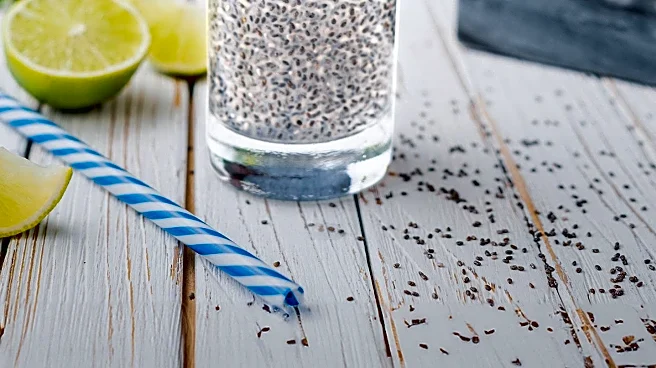What is the story about?
What's Happening?
Chia seeds, widely recognized for their nutritional benefits, can pose significant health risks if consumed improperly, according to Dr. Saurabh Sethi, a gastroenterologist trained at Harvard and Stanford. Dr. Sethi highlights the danger of consuming dry chia seeds without soaking them first, which can lead to esophageal blockages. This occurs because chia seeds expand upon contact with water, potentially causing serious medical emergencies. To prevent such risks, Dr. Sethi recommends soaking chia seeds for at least 30 minutes before consumption, allowing them to form a gel-like texture that aids digestion. Chia seeds are rich in omega-3 fatty acids, dietary fiber, proteins, vitamins, and minerals, making them a popular choice among health enthusiasts. However, the potential for esophageal blockage underscores the importance of proper preparation.
Why It's Important?
The warning from Dr. Sethi is significant as chia seeds are commonly consumed for their health benefits, including improved gut and heart health. The potential for esophageal blockage presents a serious risk, particularly for individuals with pre-existing swallowing issues or gastrointestinal conditions. This advisory highlights the need for public awareness regarding the correct consumption methods of chia seeds to avoid health emergencies. As chia seeds continue to gain popularity in health and wellness circles, understanding the risks associated with improper consumption is crucial for consumer safety. The advice to soak chia seeds before eating them could prevent hospital visits and ensure that individuals can safely enjoy their nutritional benefits.
What's Next?
As chia seeds remain a staple in many diets, it is likely that health professionals and nutritionists will emphasize the importance of proper preparation methods. Educational campaigns or guidelines may be developed to inform consumers about the risks of consuming dry chia seeds and the benefits of soaking them. Additionally, food manufacturers might consider providing preparation instructions on packaging to ensure consumer safety. The broader health community may also explore further research into the effects of chia seeds on individuals with specific health conditions, potentially leading to tailored dietary recommendations.
Beyond the Headlines
The issue of chia seed consumption touches on broader themes of food safety and consumer education. It raises questions about how superfoods are marketed and the responsibility of health professionals to provide comprehensive dietary advice. The incident also highlights the importance of understanding traditional foods and their preparation methods, as chia seeds have been used for centuries by indigenous cultures. This situation may prompt discussions on the balance between promoting nutritional benefits and ensuring consumer safety in the health and wellness industry.
















